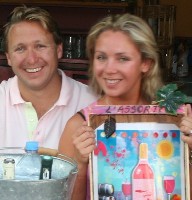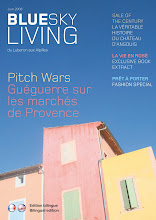In the market this morning I learnt some new sayings and had a chance to reflect on some old ones.
First the new ones:
“Oursin dans les poches,” - A disparaging label for tourists who refuse to buy anything. Literally it means that they have sea urchins in their pockets. If you’ve never seen a sea urchin before visualise a miniature second world war mine floating at sea - they are round, small, spiky, salty, balls of anger and if you had one in your pocket you certainly wouldn’t be rooting around for loose change.
“Le Gibier d’Ete” - I first read about this saying in Peter Mayle’s excellent A-Z of Provence, but had never heard it used before. Once again it’s a derogatory way to describe tourists, in fact a market traders worst nightmare is that the Gibier D’Ete might all end up having Oursin dans les Poches. Gibier in French is an umbrella term for game and includes wild boar, hares, partridges, in fact pretty much anything that can be shot at. In summer when hunting is banned, the locals have to prey on the tourists instead. Hence their nickname “les gibiers d’ete.”
And a couple of old ones from England:
“The grass is always greener on the other side” - this expression came to mind as a delightfully eccentric French lady lectured me about the superiority of English society. She reflected on her visits to Kent villages, and described how people made way for her as she drove down the street, opened the door to her car, let her cross the road and generally behaved in a gentlemanly way. England she concluded was a much more polite society than France. I didn’t dare point out that nearly seven million English people a year thought differently and chose to spend their summer holiday in France.
“There’s no such thing as a free lunch” - Well there is if you are a Provencal market trader (and you are prepared to stand in the markets all winter making friends with the other vendors). As I set up at 7am this morning, Martine the honey and asparagus saleswoman who has the stand next to us, handed me a bag full of fine asparagus. “It’s perfect for soups and omelettes,” she advised. Later in the morning with my stomach rumbling I went in search of eggs. Barbara who runs the boucherie wouldn’t hear of me paying for a dozen of her free range, and so back at home at 2.30 I sat down to my lunch and started thinking about writing something on sayings, and whether they were true.
I’ll let you know whether the tourists really do become our prey or whether they turn out to have sea urchins in their pockets. As for the grass being greener, I am on the side of the 7 million English who come to France, it’s really rather idyllic here.
Finally for those of you who are regular readers of this column, the promised update on our big cat. Since I wrote the piece there have been no more sightings, but we did have a visit from a South African tracker, Owen, a man who’d spent a lifetime working in the Kruger national park. He disappeared into the trees near where we’d last seen the cat and within minutes signalled us over with a piercing whistle.
“Look here, and here,” Owen said pointing with a stick at impressions in the earth, “no way that’s a dog, put your hand in the mark and you can feel the five pads.”
We complied.
“That’s a cat, and it’s a hell of a big one.”
As a result sunbathing continues to be a nervous occupation.
CLICK BELOW TO:
Tuesday, May 22, 2007
Subscribe to:
Comments (Atom)




.jpg)













